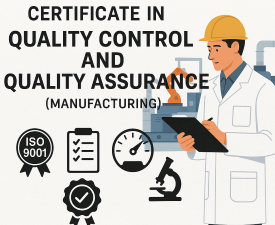Description
Course Name: Certificate in Quality Control and Quality Assurance (Manufacturing)
Course Id: CIQCQAM/Q0101.
Eligibility: Graduation or equivalent is required.
Objective: To provide learners with practical knowledge and skills to monitor, control, and improve product and process quality in manufacturing, using standards like ISO 9001, quality tools, and inspection methods to ensure compliance, reduce defects, and enhance overall production efficiency.
Duration: Three Months.






Debit/Credit Card, Wallet, Paytm, Net Banking, UPI, or Google Pay.



• A soft copy (scanned) of your certificate via email within 7 days of examination.
• A hard copy (original with official seal and signature) sent to your address within 45 day of declaration of result.

Online Examination Detail:
Duration- 60 minutes.
No. of Questions- 30. (Multiple Choice Questions).
Maximum Marks- 100, Passing Marks- 40%.
There is no negative marking in this module.
| Marking System: | ||||||
| S.No. | No. of Questions | Marks Each Question | Total Marks | |||
| 1 | 10 | 5 | 50 | |||
| 2 | 5 | 4 | 20 | |||
| 3 | 5 | 3 | 15 | |||
| 4 | 5 | 2 | 10 | |||
| 5 | 5 | 1 | 5 | |||
| 30 | 100 | |||||
| How Students will be Graded: | ||||||
| S.No. | Marks | Grade | ||||
| 1 | 91-100 | O (Outstanding) | ||||
| 2 | 81-90 | A+ (Excellent) | ||||
| 3 | 71-80 | A (Very Good) | ||||
| 4 | 61-70 | B (Good) | ||||
| 5 | 51-60 | C (Average) | ||||
| 6 | 40-50 | P (Pass) | ||||
| 7 | 0-40 | F (Fail) | ||||







Syllabus:
Module 1: Fundamentals of Quality Control and Assurance in Manufacturing
Definition and importance of QC and QA, Key differences between QA and QC, Quality in the manufacturing process, Principles of Total Quality Management (TQM), Overview of ISO 9001:2015 standards, Stages of product quality inspection, Roles and responsibilities of QA/QC professionals, Quality planning and quality objectives, Understanding customer requirements and specifications, Introduction to Six Sigma concepts.
Module 2: Inspection Tools and Measurement Techniques
Types of inspection in manufacturing (incoming, in-process, final), Basic measuring instruments (vernier caliper, micrometer, height gauge), Advanced instruments (CMM, profile projector), Calibration of measuring tools and standards, Use of gauges and templates, Visual inspection techniques, Surface finish and hardness testing, Dimensional and geometric tolerance checks, Equipment maintenance for accuracy, Documentation of inspection results.
Module 3: Quality Testing Methods and Material Analysis
Destructive and non-destructive testing (NDT), Mechanical testing (tensile, impact, hardness), Metallurgical testing (microstructure, grain size), Chemical analysis of raw materials, Material traceability and certifications, Welding and coating quality checks, Sample preparation and testing procedures, Lab safety and testing protocols, Data recording and analysis, Interpretation of test reports.
Module 4: Statistical Process Control and Quality Improvement
Basics of Statistical Process Control (SPC), Control charts (X-bar, R, p, np, c charts), Process capability indices (Cp, Cpk), Pareto analysis and histogram, Fishbone diagram (Ishikawa), 5 Whys for root cause analysis, Cause and effect matrix, Process mapping and value stream analysis, Use of check sheets and scatter diagrams, Implementation of corrective and preventive actions (CAPA).
Module 5: Quality Management Systems and Documentation
Structure of Quality Management System (QMS), Preparing quality manuals and SOPs, Internal quality audit procedures, Quality records and traceability, Product identification and labeling, Non-conformance reporting (NCR), Handling deviations and rework procedures, Supplier quality management system, Compliance to regulatory and safety norms, Role of documentation in continuous improvement.
Module 6: QA/QC Practices and Professional Skills
Developing a quality culture in manufacturing, Work ethics and professional conduct in QA/QC, Teamwork and communication with production staff, Problem-solving skills in quality issues, Managing inspection teams and schedules, Customer complaint handling and resolution, Industry-specific QA/QC standards (automotive, pharma, electronics), Practical case studies of quality improvements, Career paths in QA/QC, Tools for digital quality monitoring.
After successful completion of the Certificate in Quality Control and Quality Assurance (Manufacturing) program, graduates are equipped with essential skills to ensure that products meet industry and regulatory standards. This qualification is highly valued in India’s fast-growing manufacturing sector, where quality, compliance, and efficiency are critical to success.
🎓 Career Opportunities in Manufacturing (QA/QC)
1. Quality Control Inspector
-
Role: Inspect raw materials, in-process items, and final products for defects.
-
Industries: Automotive, Electricals, Consumer Goods
-
Salary Range: ₹2.2 – ₹4 LPA (Freshers), ₹5 – ₹7.5 LPA (Experienced)
2. Quality Assurance Executive
-
Role: Implement quality systems (ISO, GMP, TQM), conduct internal audits, ensure documentation.
-
Industries: Pharma, Electronics, Industrial Goods
-
Salary Range: ₹3 – ₹5.5 LPA (Entry Level), ₹6 – ₹9 LPA (With 3–5 years experience)
3. Manufacturing Process Auditor
-
Role: Audit production lines for compliance with SOPs, reduce waste and rework.
-
Industries: Steel, Heavy Machinery, Food Processing
-
Salary Range: ₹3 – ₹6 LPA
4. Production Quality Engineer
-
Role: Develop and improve QA/QC techniques in manufacturing processes.
-
Industries: Aerospace, Automotive, Electronics
-
Salary Range: ₹4 – ₹7 LPA
5. Supplier Quality Assurance (SQA) Engineer
-
Role: Evaluate and approve vendors, monitor supplier quality metrics.
-
Industries: Automotive, Electronics, FMCG
-
Salary Range: ₹3.5 – ₹6.5 LPA
6. Calibration Technician
-
Role: Calibrate and maintain manufacturing equipment to ensure measurement accuracy.
-
Industries: Precision Manufacturing, Pharma, Medical Devices
-
Salary Range: ₹2 – ₹4.5 LPA
7. Documentation & Quality Records Coordinator
-
Role: Maintain detailed records of QC inspections, testing protocols, and ISO documentation.
-
Industries: Packaging, Electrical, Pharma
-
Salary Range: ₹2 – ₹3.5 LPA
8. In-Process Quality Checker
-
Role: Monitor quality during each stage of the manufacturing process.
-
Industries: Garments, Plastics, Food Manufacturing
-
Salary Range: ₹1.8 – ₹3.5 LPA
9. QA Lab Technician
-
Role: Conduct product/material tests (chemical, mechanical, durability).
-
Industries: Paints, Adhesives, Materials Manufacturing
-
Salary Range: ₹2 – ₹4 LPA
10. Production Line Supervisor (With QA Responsibilities)
-
Role: Oversee quality at the shop-floor level, enforce quality standards.
-
Industries: FMCG, Metal Fabrication, Industrial Goods
-
Salary Range: ₹3 – ₹5.5 LPA
🏭 Major Hiring Sectors
-
Automobile and Auto Components
-
Pharmaceutical & Chemical Manufacturing
-
Food Processing & Packaging
-
Electrical & Electronic Goods
-
Heavy Machinery & Tools
-
Textile & Apparel Manufacturing
📈 Career Growth Path
| Level | Position | Salary Range (approx.) |
|---|---|---|
| Entry | QC Technician, QA Assistant | ₹2 – ₹4 LPA |
| Mid-Level | QA Executive, Production Quality Engineer | ₹4 – ₹8 LPA |
| Senior | QA/QC Manager, Manufacturing Head | ₹9 – ₹18+ LPA |










Reviews
There are no reviews yet.